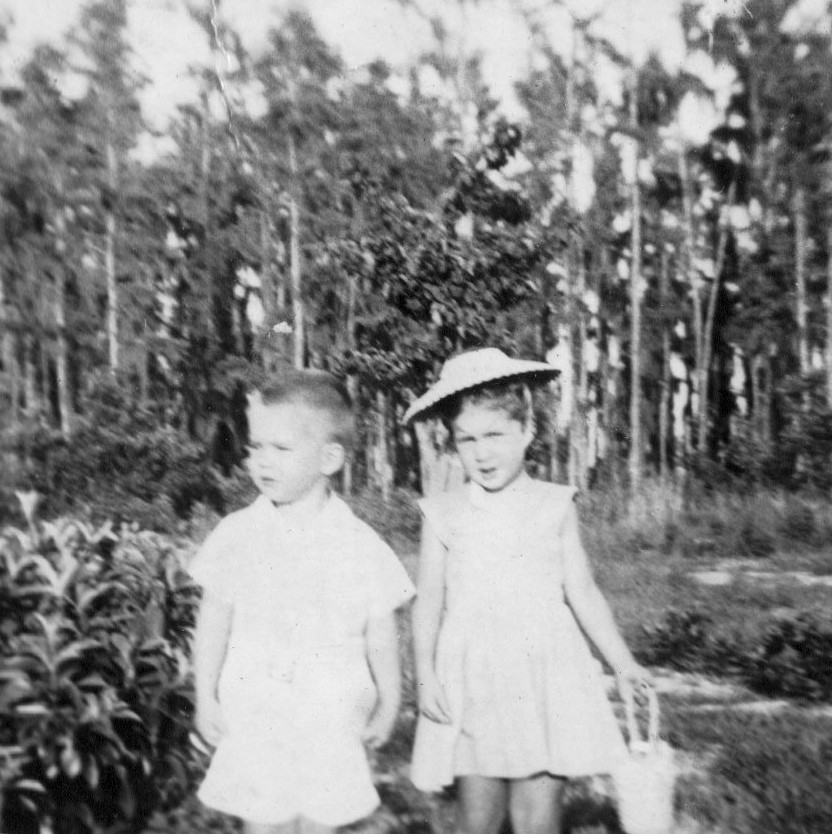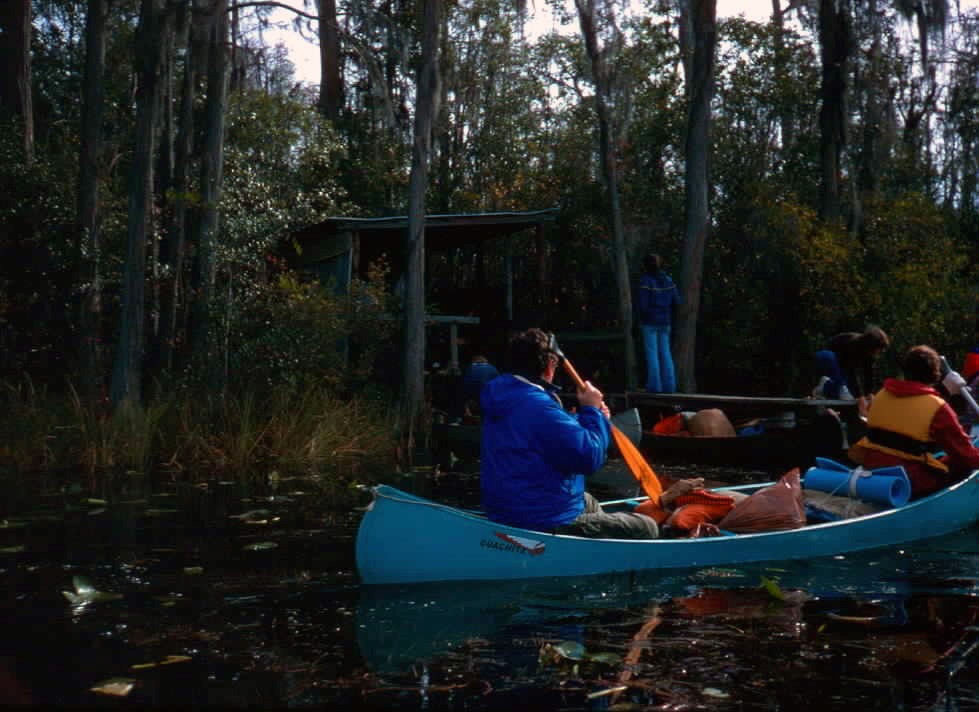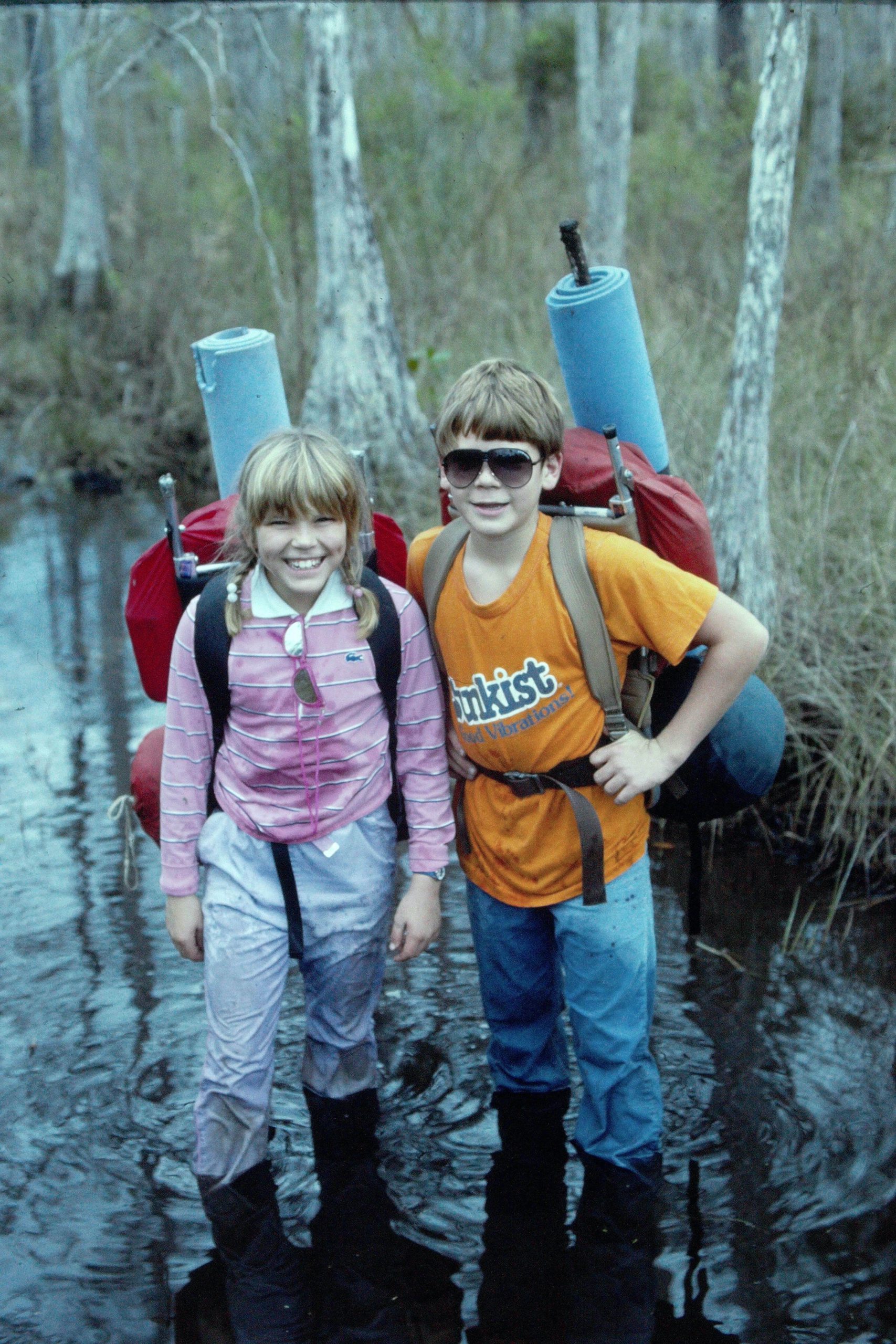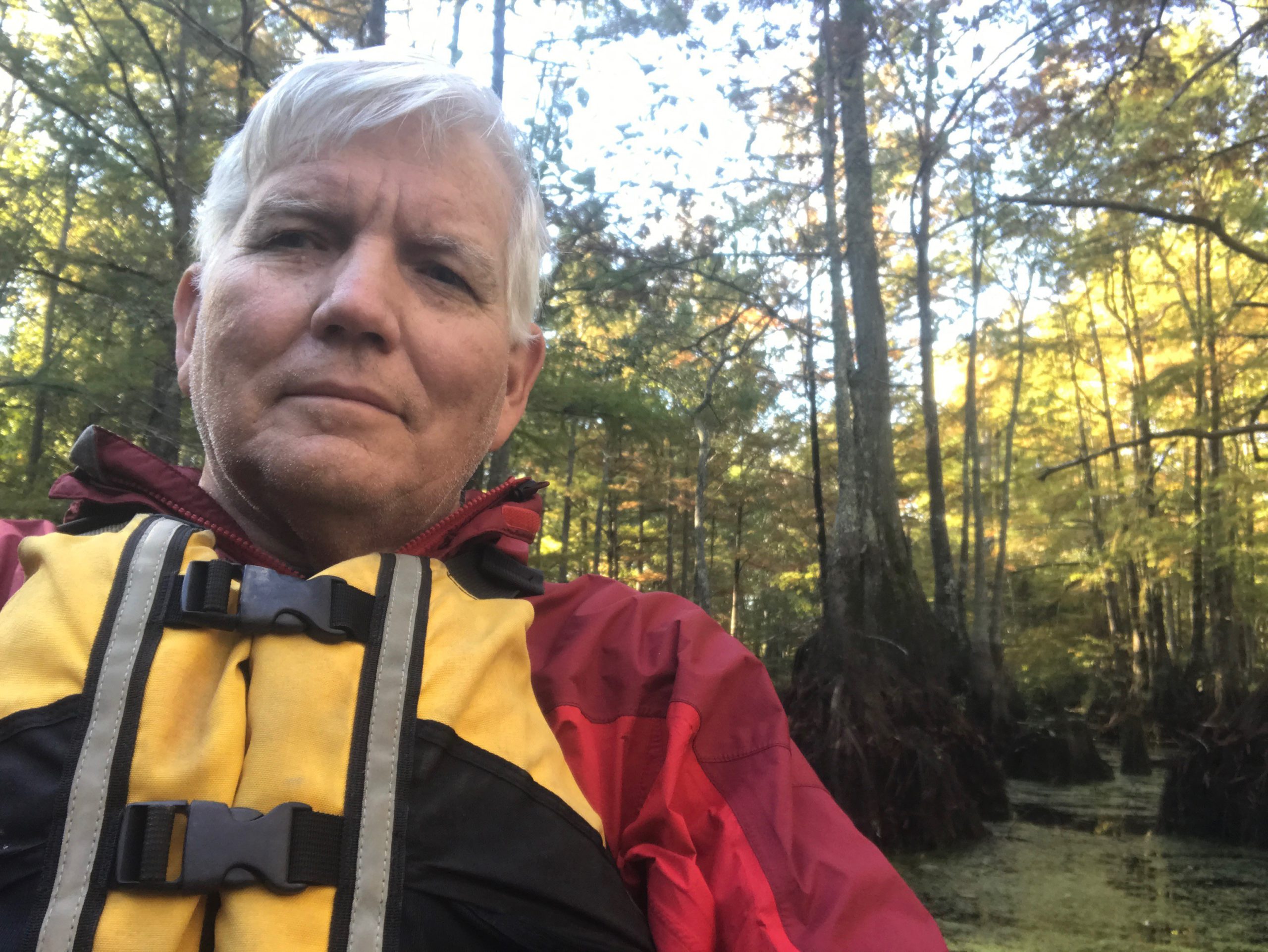Drain the swamp! …I take personal offense at the idea.
Drain the swamp! …But they are some of Creation’s greatest achievements!
Drain the swamp? …Some of my best friends are swamps.
How did such a place of beauty and life and light come to have such negative connotation? Perhaps it was John Bunyan’s “Slough of Despond” in Pilgrim’s Progress (1678) that shaped our view of the swamp as a place of evil. He wrote:

Hank and his sister, Janice, Half Moon Lake, Florida, in front of “the slough”
“This miry Slough is such a place as cannot be mended; it is the descent whither the scum and filth that attends conviction for sin doth continually run, and therefore is it called the Slough of Despond: for still as the sinner is awakened about his lost condition, there ariseth in his soul many fears, and doubts, and discouraging apprehensions, which all of them get together, and settle in this place; and this is the reason of the badness of this ground.”
My first encounter with the swamp was when I was a child. Our family bought ten acres of lake property outside of Tampa right after WWII. After clearing much of the land and building a house, they put in a large lawn that stretched from the house to the lake. Just beyond the lawn there was a swamp in a thicket of underbrush and cypress trees. This was — for me and my sister — a place where you never ventured. Coincidently with Bunyan’s allegory, we called it “the slough” and it appeared only in the background of family photos.
Drain THAT swamp?—It can’t be drained

Platform for camping in the Okefenokee Swamp, Georgia
As an adult, I grew to love the swamp.
I once paddled thirty-one miles with ten teenage boys across the width of the Okefenokee Swamp. For two nights we slept on platforms one foot above the water. We paddled part of the way through the swamp in a canal next to what once was a railroad.
At the beginning of the last century they logged the trees and hoped to drain the water to make room for agricultural land. Didn’t work. It wouldn’t be drained.
The Okefenokee actually has a natural outlet — The Suwanee River. I paddled that river for ten days and camped out ten nights starting in the swamp and ending more than halfway to the Gulf of Mexico — 166 miles downstream from where I put in. The first night out, I was

The Everglades
still in the swamp and found just enough ground a few inches above the water to sleep under my tarp in the rain.
Drain the swamp?—Lose some drinking water
I also slept on the ground while backpacking in the vast Everglades. I dragged my then grade-school-aged children along — sometimes walking in thigh-deep water. Sadly, this swamp has been mostly drained, although governments and NGOs are trying to restore some of what has been lost.
Swamps take runoffs and river overflows. They filter the water, leaching out the contaminants as it percolates into the caverns below. Turns out, all of those condos on Miami Beach depend on the water in the aquifer below the ‘Glades.
Drain the swamp?—A home for wildlife
I share my temporary homes in the swamps with other creatures. Many a night, I have slept on the ground at the edge of a swamp on Cumberland Island, Georgia. A favorite pastime at night was to stand in the darkness with a flashlight pointing toward the water, trees, and grass. If the eyes shining back were low, it was a ‘gator — if they were high, it was most likely a raccoon.

Limpkin in the headwaters of the Loxahatchee River, Florida
Of course, when you think “swamp,” you think alligators. These guys have been around at least for 37 million years, 125 times longer than we have. Who gets first dibs on the swamps?
Also fishing the shallow waters are many graceful birds; the egrets, herons, limpkins, ibises, and anhingas.
I remember walking on a dirt road cut through the swamp next to my campsite on Cumberland Island one sunny, cool March morning and stepping around four cottonmouth moccasins. One time paddling under low-hanging trees in the swampy headwaters of the Hillsborough River near Tampa, I looked up to see one of these very poisonous snakes sunning just above my head.
My swamp adventures continue…
Speaking of swampy headwaters, Florida rivers often start in wet woodlands. Paddling Fisheating Creek on the western edge of the Everglades and the Loxahatchee River on the eastern, both presented problems in pathfinding amidst the cypress and other dense growth.
I’ve also paddled into The Great Dismal Swamp in southeastern Virginia. Up until the Civil War, this once inaccessible land, for generations, was home to “maroons,” whole communities of formerly enslaved people. It has been said that these communities were so isolated that some of their inhabitants had never seen a White person. (Drain that swamp and people lose their freedom.)

Dawn in the Chakchiuma Swamp, Mississippi
Now, living in Mississippi, I have been on a quest to find new swampy waters. A birding friend suggested I look west where there was one of the last sightings of the now thought-to-be extinct ivory-billed woodpecker. The White River National Wildlife Refuge, just over the Mississippi River in Arkansas, has been calling my name and I have heeded the call. The earth where I lay down here is under six feet of water much of the year. When the waters recede, lakes and swamps appear. Priceless.
Closer to home, within the city limits of Grenada, Mississippi, one half-mile from the town square and its Confederate statue (now wrapped in tarps) and not far from the gravesite Mississippi John Hurt, is the Chakchiuma Swamp — three hundred acres of cypress wetlands in connected oxbow lakes cut off from the nearby Yalobusha River. I have timed my visits there to put in just as the sun is rising.
Drain the swamp?—I don’t think so

Sunrise in the swampy waters of the White River National Wildlife Refuge, Arkansas
A swamp at dawn is a moment of serenity to behold. The birds are awakening at first light. Fish are rising and gently break the water’s surface. A turtle’s head occasionally peaks out only to quickly disappear upon seeing an intruder. Even the expanse of the Okefenokee Swamp has a special beauty at sunrise. Light and sky and trees and fog and water and wildlife and the organic ooze at the bottom of it all. Yes.
Drain the swamp? I don’t think so. To connect the worst of Washington insiders to these majestic creations of nature is an insult to swamps.

